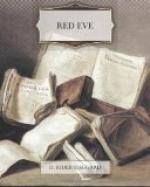“Nay, to be just, it was not all cowardice. The wizard in the yellow cap, he who showed himself to the people afterward and called down this Black Death on Venice, appeared to him in the darkness and said something to him that turned his heart to water. I think it was that if he stayed, within five short minutes he’d be dead, who otherwise, if he fled, had yet a breathing space of life. So he went.”
“Ay. But whither, man? Whither?”
“Here to his house, where he disguised himself and bade me prepare to travel with him. Only then the sickness took me and I could not. So he went with some of his people, riding for Avignon.”
“What to do at Avignon?”
“To obtain the confirmation of his marriage with the lady Eve Clavering. It has been promised to him by certain cardinals at Court who have the ear of his Holiness the Pope.”
“Ah, I thought it! What more?”
“Only this: tidings reached him that the lady Clavering, with the old Templar, Sir Andrew Arnold, journeys to Avignon from England, there to obtain the dissolution of their marriage with Sir Edmund Acour, Count de Noyon, Lord of Cattrina. In Avignon, however the cause may go, Cattrina purposes to snare and make her his, which will be easy, for there he has many friends and she has none.”
“Except God!” exclaimed Hugh, grinding his teeth.
“And Sir Andrew Arnold,” broke in Dick, “who, like some others, is, I think, one of His ministers. Still, we had better be riding, master.”
“Nay, nay,” cried Nicholas in a hoarse scream. “Tarry a while and I’ll tell you that which will force the Pope to void this marriage. Yes, it shall be set in writing and signed by me and witnessed ere I die. There is ink and parchment in yonder little room.”
“That’s a good thought,” said Hugh. “Dick, fetch the tools, for if we try to move this fellow he will go farther than we can follow him.”
Dick went and returned presently with an ink-horn, a roll of parchment, pens and a little table. Then Hugh sat himself down on the altar rail, placing the table in front of him and said:
“Say on. I’ll write, since you cannot.”
Now Nicholas, having before his glazing eyes the vision of imminent judgment, briefly but clearly told all the truth at last. He told how he had drugged Red Eve, giving the name of the bane which he mixed in the milk she drank. He told how when her mind was sleeping, though her body was awake, none knowing the wickedness that had been wrought save he and Acour, and least of all her father, they had led her to the altar like a lamb to the slaughter, and there married her to the man she hated. He told how, although he had fled from England to save his life, Acour had never ceased to desire her and to plot to get her into his power, any more than he had ceased to fear Hugh’s vengeance. For this reason, he said, he had clad himself in the armour of another knight at Crecy, and in that guise accepted mercy at Hugh’s hand, leaving de la Roche to die in his place beneath that same hand. For this reason also he had commanded him, Nicholas, to bring about the death of Hugh de Cressi and his squire beneath the daggers of assassins in the streets of Venice, a fate from which they had been saved only by the wizard in the yellow cap, whom no steel could harm.




